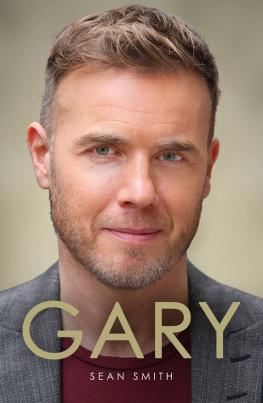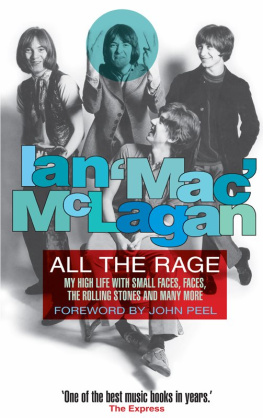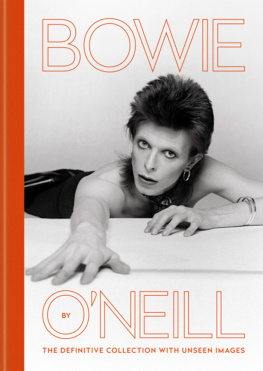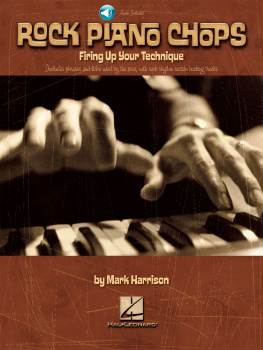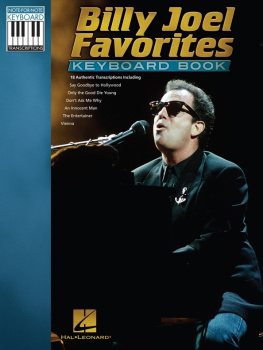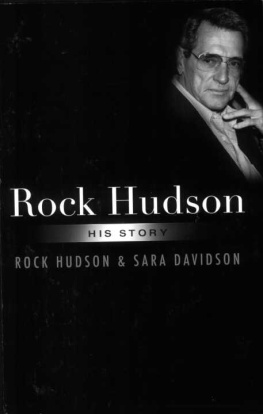Copyright 2016 Omnibus Press
This edition 2016 Omnibus Press
(A Division of Music Sales Limited, 14-15 Berners Street, London W1T 3LJ)
EISBN: 978-1-78323-619-0
Cover designed by Fresh Lemon
Picture research by Jacqui Black & Andy Neill
The Author hereby asserts his / her right to be identified as the author of this work in accordance with Sections 77 to 78 of the Copyright, Designs and Patents Act 1988.
All rights reserved. No part of this book may be reproduced in any form or by any electronic or mechanical means, including information storage and retrieval systems, without permission in writing from the publisher, except by a reviewer who may quote brief passages.
Every effort has been made to trace the copyright holders of the photographs in this book, but one or two were unreachable. We would be grateful if the photographers concerned would contact us.
A catalogue record of this book is available from the British Library.
For all your musical needs including instruments, sheet music and accessories, visit www.musicroom.com
For on-demand sheet music straight to your home printer, visit www.sheetmusicdirect.com
For Laneole, Krissie & The Chuch
Introduction
T HROUGHOUT their relatively short six-year tenure, the Faces embodied the perfect balance of sloppiness and discipline, informality and seriousness, sensitivity and arrogance a good time, rocknroll band with no pretensions to grandeur. There was a lot of that East End thing that the Small Faces had that went into the Faces, Ronnie Lane proudly told journalist Penny Valentine in 1974. That attitude the Faces had was the attitude that I liked.
The starring cast was made up of five disparate characters a flamboyant yet shy, sandpaper-voiced front man in Rod Stewart whose distinctive voice earned him the nickname Golden Catarrh from one music paper, a similarly spiky-haired, affable guitarist Ron Wood, a spiritual rascal and affecting songwriter Ronnie Lane, a sharp-witted raconteur and pithy player of the 88s Ian Mac McLagan and a quiet but solid dark horse in drummer Kenney Jones.
While not the best musicians treading the concert stages of the early to mid-Seventies, their unpretentiousness and sheer force of personality more than made up for this. In an age of bland collectivism the Faces had a comedic quality that Ron Wood once described as the Marx Brothers on the road.
Formed in 1969 out of the remains of the Small Faces and the Jeff Beck Group, the individual Faces had paid their dues over the past five years in such groups as the Outcasts, Jimmy Powell & The Five Dimensions, the Hoochie Coochie Men, the Muleskinners, Steam Packet, the Birds, and the Creation. Thanks to the entrepreneurial might behind them, the Small Faces rose to pop fame in Britain in 1965, yet by the time the group disbanded with the departure of charismatic frontman Steve Marriott, they had little to show for their success. At the same time Stewart and Wood despaired at being treated as dispensable sidemen to bolster Jeff Becks star. Marrying the light-heartedness of the Small Faces with the contemporary blues approach of the Jeff Beck Group, it was apparent that the Faces were to be a different proposition.
Of course you compared them to the Small Faces because there were three of them in it, observed DJ and friend, Jeff Dexter, but it didnt have that kind of rawness of the Small Faces in terms of grooving and dancing. This was more like a pub brawl than a soul band even though they were very soulful.
Initially ignored by the hip cognoscenti in Britain who regarded them as pass the Faces were quick to make their mark in America thanks to the reputation Stewart and Wood had cultivated with Jeff Beck. Through a potent combination of hard work, creativity and a readily identifiable image of approachable lads next door at the best party you ever had, they overcame this initial indifference to become one of the biggest and best loved bands of the Seventies.
Many observers felt the Faces never realised their full potential on record but compensated for this by projecting their music via their personalities. Other bands of the era, notably Mott The Hoople and Slade, shared the same traits, but achieved nowhere near the same intense audience interaction.
On a good night and with the Faces you had a 50-50 chance of catching them on a good night they were absolutely spectacular, says Faces roadie Russ Schlagbaum. I remember being on stage with them and just being freaked out because they were so good.
This notoriously unpredictable inconsistency as to which Faces you would encounter was mainly down to their legendary fondness for a friendly tipple before, during and after a show. It all stemmed from the early days when we used to think nobody wanted to hear us, Stewart explained to Zigzag in 1971, so we used to go and get pissed and then go on and have a laugh.
We were all drinkers, Ron Wood added, drinking at rehearsals and recording sessions it was just a natural progression to take it onto the stage although we didnt know it was going to get out of hand.
The Faces inclusive brand of boozy blues and soused soul extended beyond the spotlight; along with bands like the Who and Led Zeppelin they perfected the on-the-road practice of annihilating hotel rooms down to a fine art (if it could be defined that way), while indulging in all the typical trappings of the Seventies rock star. But then a seismic change in their happy dynamic occurred when Stewart achieved unimaginable success with his third solo album Every Picture Tells A Story and its single, Maggie May.
From the outset concert promoters, particularly in the States, invariably billed the group as featuring Rod Stewart. Although Rod continued to insist his albums were merely a sideline to the Faces they ended up selling more in direct proportion to the groups, leading many outsiders to speculate that he would now ditch the Faces to further his own self interest.
Some saw it as fortuitous for Stewart who had the best of both worlds in having a superb backing band, one that he didnt have to pay a salary to but who nevertheless played his songs on tour and effectively promoted both him and them.
This state of affairs became intractable for the Faces bassist and founder. Ronnie Lane was one hell of a character as his former school chum and band mate Ron Chimes remembered him. As Stewart now readily admits, When Ronnie left the band the spirit of the Faces left. Lanes subsequent vision of taking his music back to the roots, and his ultimate ambition, playing under a circus big top was an admirable aim. However his single-mindedness cost him dearly both financially and in health.
The Faces continued, recruiting an inscrutable Nipponese, Teachers toting Tetsu Yamauchi, to replace Lane but the band virtually ceased to function in the studio. Once Wood accepted an offer to join his heroes the Rolling Stones, ostensibly on a temporary basis, it was obvious that the writing was on the wall. While Yamauchi returned to Japan, McLagan and Jones to a reformed Small Faces and then different ventures with various artists, Stewart and Wood went on to greater achievements but it was their time making music and mayhem with Lane, McLagan and Jones that continues to thrill and fascinate particularly for succeeding generation of musicians such off the cuff examples being the Replacements, Guns N Roses, Red Hot Chili Peppers, the Black Crowes and the Quireboys.

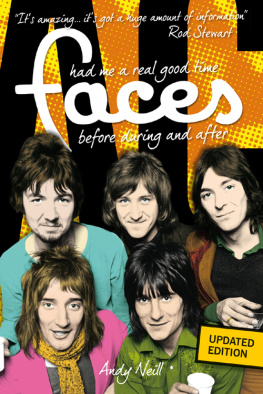

![Neill - The space [within]: finding your way back home](/uploads/posts/book/222935/thumbs/neill-the-space-within-finding-your-way-back.jpg)


